Have you ever been prescribed birth control pills to help fight your persistent acne? If so, you are not alone – millions of women every year turn to hormonal contraceptives to clear up their skin, on doctors’ orders.
But does birth control actually help treat acne? We often hear mixed reviews. While some women rave about birth control being the ultimate cure to their acne, many women claim the exact opposite – that birth control pills immediately triggered their previously nonexistent acne. So what is the truth? Does birth control cure or cause acne?
Before we answer this question, let me first explain how hormonal birth control works and how it affects acne.
Hormonal Birth Control and Acne
Acne is often the result of hormonal imbalance in the body – your doctor might call it an ‘androgen-mediated’ problem. In other words, androgens (also known as male sex hormones) play a key role in your body regardless of your sex or gender. Androgens, such as testosterone, boost skin cell growth and stimulate the skin to produce more oil. This can then lead to blocked pores and thus acne.
Most hormones have a counterregulatory hormone – a hormone that opposes its effects. The counterregulatory hormone of testosterone is estrogen, which is commonly supplied in birth control pills. This is why many doctors recommend hormonal birth control for treating acne. The estrogen supplied in the birth control can counter the effects of testosterone.
So now we know why birth control methods are often prescribed for acne, let’s go back to our original question – does birth control cure or cause acne? The reality is that birth control can both cure AND cause acne. Studies show that birth control pills can reduce acne by 55% on average. However, acne may come back even worse after the pill is stopped. Birth control can also make your acne worse if it lacks sufficient antiandrogenic properties.
But now that we know that birth control CAN improve acne, let’s dig a bit deeper. Which methods are the most effective? Do pills have the same impact as IUDs or injections? Are there any downsides to using hormonal contraceptives for acne? What happens when you choose to forego your contraceptives in the future? There are so many questions surrounding this complex subject, and this article will answer all of them and more.
Overview of Birth Control Options
There are two major factors to consider when evaluating your birth control options:
The first is the type of hormone they contain. All birth control methods contain either progestin-only or BOTH progestin and estrogen. Progestin is a synthetic version of the hormone progesterone, and estrogen is a counterregulatory hormone of testosterone, as mentioned above.
The second way to categorize birth control options is by delivery method. The most common methods include:
- Pill – a daily dose of hormones taken by mouth. There are dozens of different brands and types, delivering different amounts of hormones to prevent ovulation. Popular brands include Yaz, Diane-35 and Valette.
- Implant – a tiny rod inserted into your arm, where it releases hormones into your body. This method can last up to four years.
- Patch – worn on the stomach, upper arm, or back. This thin patch also releases hormones into your body and must be replaced weekly for three weeks, with one week off before your monthly cycle begins again.
- Shot – also known as Depo-Provera. A new shot must be given every three months.
- Vaginal ring – commonly known as the NuvaRing. This hormone-releasing ring sits inside the vagina and must be replaced every month.
- Intrauterine device– also known as the IUD. This can come in two types: a non-hormonal copper IUD (ParaGard) which can last for up to twelve years, and a hormonal IUD (Mirena, Liletta, or Skyla) which can last between three and six years.
So which is more important – the type of hormone, or the method of delivery? When aiming to clear your skin, the only thing that matters is the type and amount of hormone delivered by the birth control.
Progestin-only methods including the Depo-shot, IUD, implant, and certain pill formulations (called ‘mini-pills’) will likely not be effective for acne control since they lack estrogen. Not surprisingly, progestin-only methods tend to aggravate acne, while those with both progestin and estrogen can reduce acne. The type of progestin can also play an important role, which we’ll delve into later.
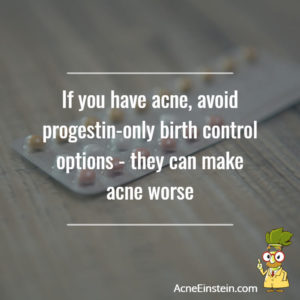
How Much Can Birth Control Pills Reduce Acne?
A paper published in 2014 combines data from 32 quality studies across the globe to examine the effects of birth control pills and antibiotics for acne. The graph below is a summary of the pooled data showing the average reduction in different types of acne after three and six months of treatment with either antibiotics or birth control pills.
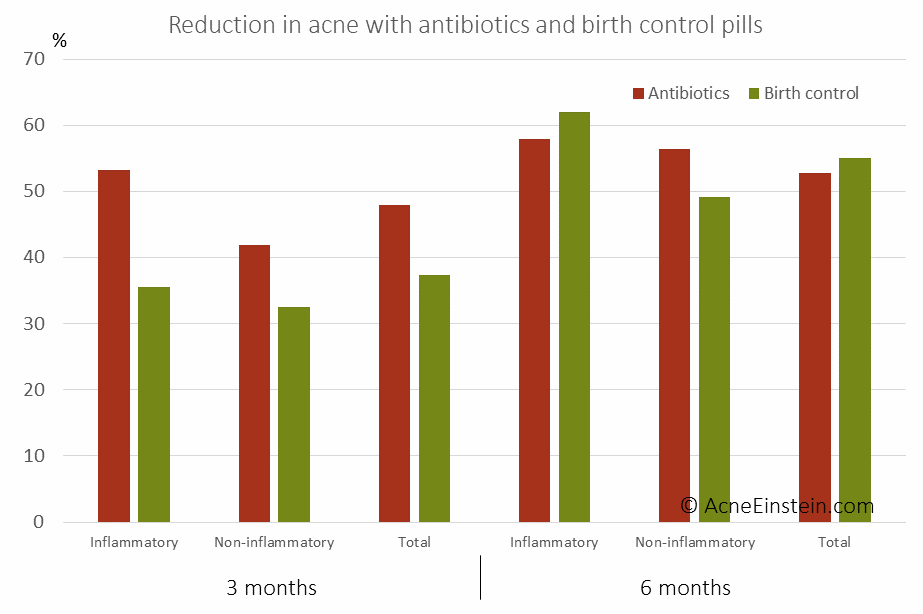
You can see that antibiotics produced strong results after just three months. Birth control pills took a little longer, but after the six-month mark their improvements in both inflammatory and non-inflammatory lesions were noticeable and comparable to those with antibiotics.
The total weighted reduction of lesions for the birth control group was 35% after three months and 55% after six months. The placebo group only showed a total lesion reduction of 28.6%.
While these are simply weighted average figures that combine a wide variety of results among several thousand women, it is clear that birth control pills can significantly improve acne for many women.
To further support these findings, a more recent study published in 2018 concluded that despite hormonal therapy not typically used as first-line treatment for acne, it can shorten the duration of antibiotic use or even eliminate the need for oral antibiotics.
How Long Does it Take to Clear Acne?
As indicated in the first study, birth control doesn’t clear acne overnight. It can take up to six months to see good results. Also keep in mind that the 55% reduction mark is only a calculated average, so not all women will reach that potential.
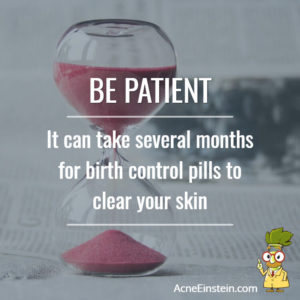
In contrast, antibiotics seem to work much faster, reaching their full potential within the first three months. However, frequent and long-term use of antibiotics is generally not recommended. Issues of toxicity and antibiotic-resistant infections (when your body no longer responds to antibiotic treatment) can be dangerous.
Frequent use of antibiotics can also cause gut problems, which can in turn cause acne according to some studies. Taking into consideration these long-term damaging effects, birth control pills provide a much safer option for acne treatment.
Can Low-Dose and Ultra-Low-Dose Birth Control Pills Reduce Acne Too?
While estrogen is necessary to counteract the acne-triggering effects of testosterone, regular birth control pills are unfortunately not for everyone.
From headaches and weight gain to depression and even hair loss, there is a wide range of side effects associated with estrogen-heavy products. Those who cannot tolerate regular pills can turn to low-dose and ultra-low-dose pills, which have also been proven effective.
When the pill was first introduced over fifty years ago, 150 mcg of estrogen per pill was standard. These pills are no longer available due to a number of health scares that led to a change in the amount of hormones contained in these products. As science and medicine revolutionized, experts developed pills with less estrogen without compromising their contraceptive effects.
Most pills available today contain around 35 mcg of estrogen, and are referred to as ‘low-dose’ pills. Some of the newer pills even as little as 20 mcg (‘ultra-low-dose’ pills). A lower dose of estrogen may reduce some of the unpleasant side effects associated with older pills, but are they as effective against acne?
A review article concluded that low-dose pills are just as effective against acne as older pills with higher estrogen content. Several clinical studies have also found ultra-low-dose pills effective in reducing acne.
That being said, if you’re looking for acne reduction with birth control pills, the rule of thumb is to choose a pill with the lowest possible dose of estrogen – a third or fourth generation pill such as Yaz, Dianette, or Qlaira.
There is no benefit to consuming more estrogen when a lower dose will offer equally effective contraception and acne reduction without the unfavorable side effects. It’s also very important to consider the type of progestin in the pill, something we’ll look at in more detail in this next section.
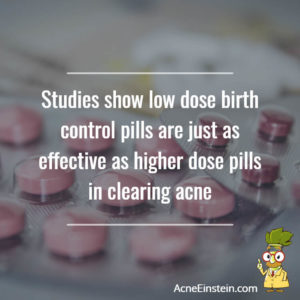
What is the Best Birth Control for Acne-Prone Skin?
So we’ve established that a contraceptive method delivering a small amount of estrogen alongside progestin is effective in both providing contraception and reducing acne. But what about the progestin itself? Is there a certain dosage or type of progestin that will be more effective against acne?
Many progestins are androgenic, which means they boost androgens and can aggravate acne. But some progestins are actually antiandrogenic, which means they can be a powerful asset in the fight against acne.
Below is a table of antiandrogenic progestins and their associated brands of birth control. These progestins block androgen receptors, effectively preventing androgen hormones from doing their job. If you suffer from hormonal acne and want to reduce the effects of androgen on your skin, these brands should be your starting point.
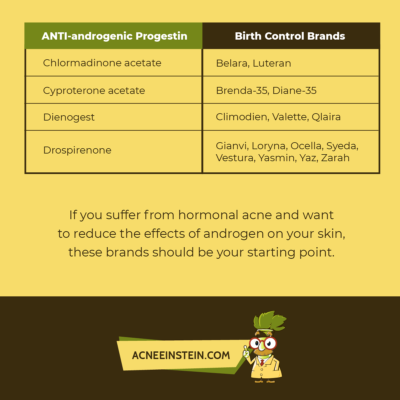
There are mixed reviews regarding the efficacy of one antiandrogenic progestin over the others. One study concluded drospirenone-containing birth control pills more effective in acne reduction than chlormadinone-containing pills, while a different study concluded the opposite statement. Another study concluded that dienogest-containing formulations were equally effective against acne compared to cyproterone-containing pills.
On the flip side of the scale, progestins with high androgenic properties can make your acne worse.
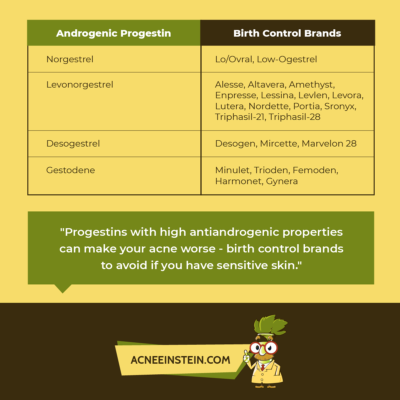
Of course, this isn’t an exhaustive list of all the birth control pills you should take or avoid. However, it is worth knowing which types of progestin are androgenic vs. antiandrogenic so that you can gauge whether a birth control pill is suitable for your needs.
To the left you can see a handy chart I compiled to help you decide which progestins to look for and which ones to avoid.
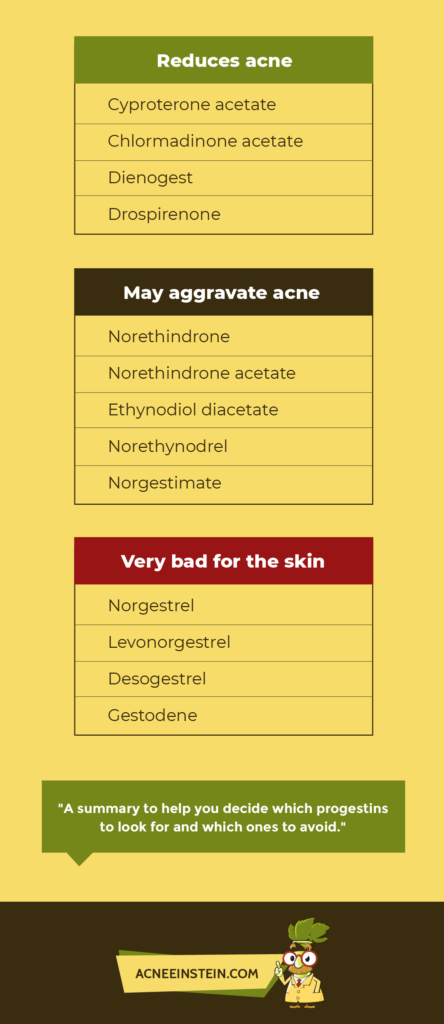
A paper published in 2017 examined all the studies that have been carried out on oral contraceptives and acne. When comparing antiandrogenic progestins (the column above) with highly androgenic progestins (the column below), studies showed that the antiandrogenic progestin pills were much more effective at reducing acne.
One study asked over 2100 women to rate their hormonal birth control options based on their effect on acne. It was discovered – as we already know – that whether or not the birth control method contained estrogen was the most important factor in determining whether it reduced or aggravated acne.
These results also found that the type of progestin was an important factor. Drospirenone received the best ratings, while norethindrone and levonorgestrel were rated as the worst.
Here’s a graph that summarizes the results from this study:
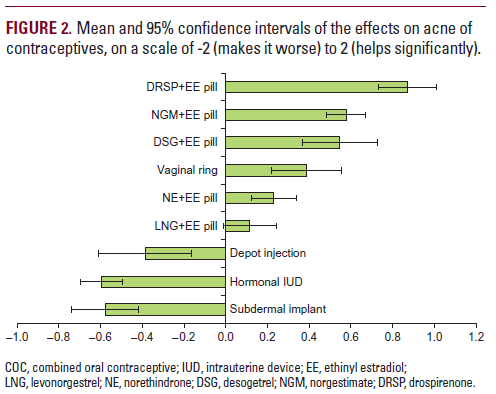
This graph may be a bit hard to understand at first glance. The direction of the green bar reflects the effect on acne (right = reducing acne, left = aggravating acne). The abbreviations refer to different types of progestins and EE means estrogen (ethinyl estradiol). As you can see, birth control methods that lack estrogen (Depo-shot, IUD, and implant) produced the least favorable results.
Interestingly enough, a triphasic dose of progestin (where the dose is stepped up in three phases during the cycle to more accurately imitate the natural fluctuations of hormones) was rated as better than a monophasic formulation.
Triphasic pills such as Ortho Tri-Cyclen are highly popular, but currently there are no triphasic formulations containing the most effective progestins against acne (drospirenone, chlormadinone acetate, dienogest or cyproterone acetate).
This is important because another study has proven that the type of progestin matters more than whether the pill is mono or triphasic. This study compared Ortho Tri-Cyclen (a triphasic pill which contains norgestimate) with Yasmin (a monophasic pill which contains drospirenone) and found that Yasmin was slightly more effective. The amount of estrogen did not play a significant factor in this particular study.
To sum it up, the most effective birth control pills for acne contain antiandrogenic progestin with a small dose of estrogen. Some of the best options include Diane-35, Yasmin, Yaz, Valette, and Qlaira.
Many women experience side-effects when taking the pill, as a result of the estrogen component. These symptoms include water retention, weight gain, and breast tenderness. The progestin drospirenone has actually been shown to counter these effects, making an ideal choice for women who suffer with any of these estrogen-associated symptoms while taking the birth control.
So putting all the pieces together, the best birth control for acne overall is one with an ultra-low dose of estrogen and an antiandrogenic progestin such as drospirenone. This puts the ultimate crown on Yaz as the most promising option for many women suffering from hormonal acne.
Can Birth Control Pills Cause Acne?
Some contraceptives are progestin-only and do not contain any estrogen. Such birth control pills are known as ‘mini-pills’. Acne sufferers should avoid these pills at all costs as they can exacerbate existing acne, rather than reducing it.
In one study, 30-40% of women using progestin-only birth control reported worse acne upon using these methods. Another study reported acne present in 34% of women on mini-pills, compared to 8% of those on combination pills (estrogen and progestin) and 18% of those on the copper IUD.
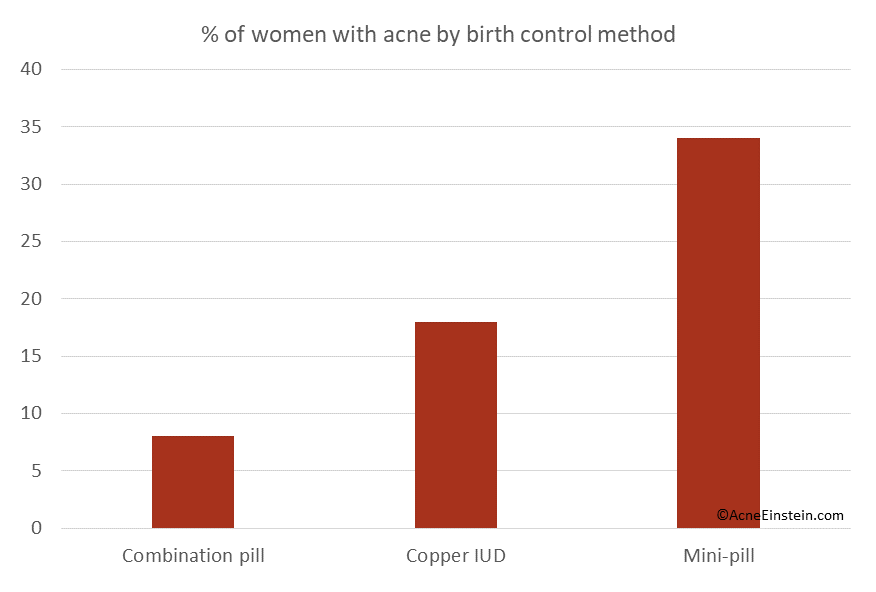
Copper-releasing implantable contraception is non-hormonal and thus has no impact on acne. If we use this as a baseline acne rate for the group, we can gauge that mini-pills almost doubled the rate of acne in women.
Here are some popular progestin-only methods that may worsen acne:
- Progestin-only pills (‘mini-pills’) – Camila, Errin, Heather, Jolivette, Norethindrone, etc.
- Implant – Nexplanon
- Shot – Depo-Provera
- IUDs – Mirena, Kyleena, Skyla, and Liletta
Remember that the ParaGard IUD is not a hormonal contraceptive. Also please note that this list is not comprehensive. Confirm to your doctor to make sure you aren’t using progestin-only contraception.
What About When I Want to Come Off the Pill?
Most women won’t stay on the pill forever. Some may come off the pill to have children or take a break from synthetic hormones while using other contraceptive methods in the meantime. So what happens when you stop taking the pill?
It’s important to remember that birth control is not a ‘cure’ for acne, but rather a temporary treatment. As long as you’re taking the pill and introducing the right combination of hormones into your body, you’re likely to see an improvement in your acne.
But once you stop taking the pill, the acne is likely to come back. Post-pill acne can often be worse than pre-pill acne and even harder to get rid of.
Let me repeat myself since many women are not aware of this before starting the pill. Many women find that post-pill acne is worse and much more difficult to fix than the acne they had before starting the pill.
When stopping the pill, your hormones will take some time to normalize. Your hormones could take several months before returning to their pre-pill levels, during which your skin can be prone to breakouts.
I asked some members of the Clear For Life Facebook group to share their experiences after stopping the pill. Click on the left and right arrows to browse through what they have shared.
Should I Go On Birth Control to Clear My Acne?
Birth control is normally prescribed for women who need contraception. If you are not seeking contraception, is it worth it to get on birth control?
While we discussed the many benefits of birth control, there are a number of other risks and side-effects that cannot be glossed over. Serious medical complications are extremely unlikely, but should always be considered when choosing a method of contraception.
Hormonal contraceptives can increase the risk of:
- Certain cancers (cervical and breast)
- High blood pressure
- Migraines
- Decreased bone density
- Blood clotting
- Yeast infections
- Benign liver tumours
Many of these risks increase with age and smoking in particular. Birth control pills must never be used in smokers over age 35 due to the increased risk of blood clots in the legs or lungs (known as venous thromboembolisms or VTE).
A study published in 2017 concluded a 3 to 7 fold increase of VTE risk in women who regularly use combination pills. Furthermore, this risk is evidenced to be higher in combination pills that contain cyproterone acetate and especially drospirenone, the progestin that is considered most effective against acne.
For these reasons, you should discuss the risks with your doctor and be extra cautious about starting birth control if you are over the age 35 and/or have the following conditions:
- History of blood clotting or heart issues
- History of smoking
- Uncontrolled blood pressure
- Diabetes
Again, remember that the severe risks are incredibly rare and these medications are still safe for millions of women to use long-term without any major problems. Here are some less serious but more common side effects of birth control:
- Weight gain or loss
- Emotional sensitivity and mood swings
- Decreased or increased sex drive
- Hair loss
- Irregular bleeding
- Nausea
And what about birth control for teenagers? This topic can be a bit tricky because it has more to do with legal constraints (i.e. parental consent) rather than the effectiveness of the pills in younger populations. Researchers from the New York University School of Medicine have spoken up about the need for more transparent guidelines on birth control prescriptions to teenagers.
The problem is further complicated by the reluctance of dermatologists to prescribe birth control for uses other than preventing pregnancy. It is therefore a common trend among dermatologists to refer their teen patients to primary care physicians or gynecologists.
If you are a teenager thinking about using birth control for acne, talk to your doctor first before making a decision to get on the pills.
Take-Away Message
When it comes to birth control and acne, there are certainly plenty to consider. The good news is that with the vast number of studies available, we can make educated and informed decisions about taking birth control for acne.
A birth control method containing small amounts of both estrogen and progestin is the most effective in treating acne. Most pills (with the exception of the mini-pill) contain both of these hormones, making them a good place to start for those suffering with acne.
It’s also important to consider the type of progestin used in that particular birth control. Progestins with antiandrogenic properties include drospirenone, dienogest, cyproterone acetate, and chlormadinone acetate. Drospirenone is rated the best for fighting acne and drospirenone-containing pills like Yasmin and Yaz are recommended by many professionals.
Lastly, remember that hormonal birth control is a temporary treatment for acne, not a cure. Once you stop the pill, hormones will return to their natural levels and acne may return. Many women find that the post-pill acne is much harder to get rid of than the acne they had before starting the pill.
Your hormonal makeup is totally unique to you. You may need to experiment with different birth control types until you find one that suits you best. This post only provides general guidelines on what to use and avoid – the rest of your acne journey is up to you.
Frequently Asked Questions
Does birth control make you break out at first?
It’s not uncommon for your acne to flare up for the first few months before you see an improvement in your acne. A good rule of thumb is to wait at least 3 months before deciding that a birth control is not working for your acne. Most birth control users will see significant results by 6 months.
Can a dermatologist prescribe birth control for acne?
There are currently 3 birth control pills that are FDA-approved for acne treatment: Ortho Tri-Cyclen, Yaz, and Estrostep. As implied in this article, many other birth controls have been prescribed as off-label use for acne.
While dermatologists can prescribe birth control for acne, they generally tend to refer their patients to a primary care doctor or gynecologist since the main indication for birth control pills is contraception, and it is critical for sexually active women to receive check-ups and pap smears before starting on birth control.
What is the best birth control for acne and weight loss?
The estrogen component of birth control is the main source of weight gain. While progesterone-only birth control pills can reduce the effects of weight gain, they are generally not effective for acne. The best birth control for both acne and weight loss would be a combination pill with the lowest dose of estrogen i.e. ultra low-dose pills.
What is the lowest dose birth control pill?
Common ultra low-dose pills (with 20 mcg of estrogen or less) include Alesse, Loestrin 1/20, Microgestin 1/20, Blisovi 1/20, and Junel 1/20. Among the lowest dose birth control pills include Lo Loestrin Fe, which is a combination pill with only 10 mcg of estrogen.
How long until acne clears after stopping taking birth control?
As mentioned before, it takes several months for your hormones to normalize after coming off the pill. However, every woman’s body is different, so it’s hard to make a blanket statement to predict your acne patterns upon stopping birth control pills.
It will generally take at least 3-4 cycles (that’s 3-4 months) for post-pill acne to resolve. Doctors also recommend using preventative measures (i.e. getting into a healthy skin routine and diet) before you come off the pill to suppress some of the effects of post-pill acne.
What is the best progesterone-only pill for acne?
Progesterone-only pills are generally not recommended for acne treatment because they tend to worsen acne. While anti-androgenic progestins (i.e. chlormadinone acetate, cyproterone acetate, dienogest, drospirenone) are more beneficial for acne, there are currently no progestin-only formulations available with these progestins.
Therefore, it’s difficult to recommend a progesterone-only pill for acne; it’s best to avoid these pills and instead use a combination pill if you are trying to use birth control for acne.
Is acne a side effect of birth control?
Depending on the type of birth control, acne can be a side effect. This is especially prevalent in progesterone-only formulations (‘mini-pills’) and birth control containing androgenic progestins.
How to treat acne caused by birth control?
When dealing with acne caused by birth control, check which formulation you are using and see if it is a progesterone-only or androgenic progestin, and inquire with your doctor to see if you can switch to a combination pill on our list (you can refer to the charts above to help you with this process).
Also keep in mind that birth control can make your acne-flare up at first before you start seeing improvement in your acne. It may be beneficial to wait a few months before deciding to switch to another formulation.

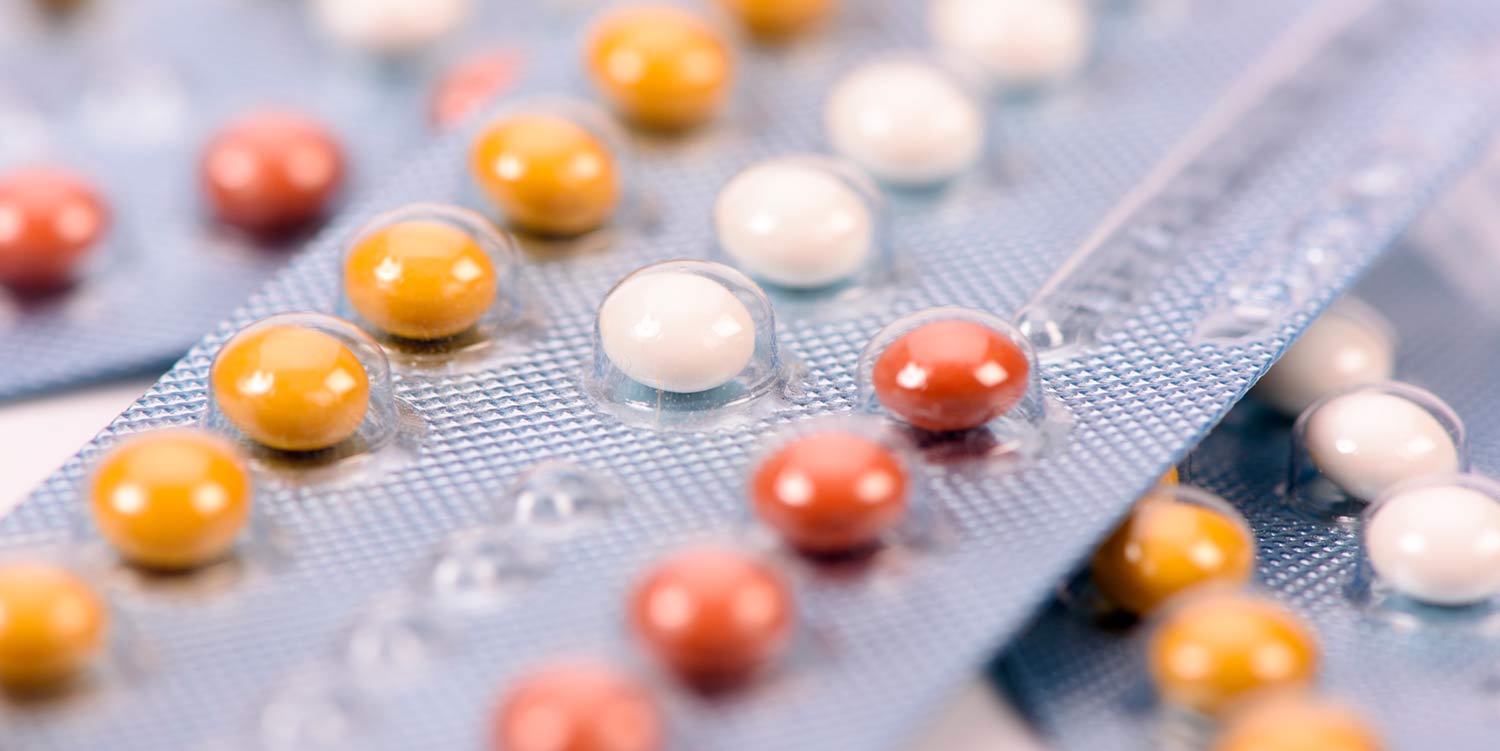
No way; I keep up with your blog and I was just prescribed Ocella (generic for Yasmin) TODAY, which has the progestin drosperinone. Ladies, OB-GYNs can prescribe your best offense against hormonal acne (which is equivalent to teenage acne), tailored to your specific needs.
Thanks for the great article! I’m going to visit an OB-GYN for a hormone level check and see if I can get on Yaz or something similar. I’m also going to try Acne.org’s regimen and hope for good results within the next 6 months!
I was prescribed the Estalis hormonal patch today and am worrying it could make my acne worse (I couldn’t find the Progestin on your list). Contains 50 Oestradial (I believe this is Eostragen) and and 140 NORETHISTERONE. Any thoughts for this one? Thanks 🙂
The fact that it has norethindrone could make it problematic for acne.
It’s weird because I was prescribed one of the pills (desogesterel) on the ” Very bad for the skin ” list you provided, but my acne has actually almost gone away while taking it. I guess it’s different for everyone.
Yeah, it depends a bit. For some women the effects of estrogen overpower any negative effects from acnegenic progestins.
My daughter was prescribed Ocella and it worked good on her acne after a few months used but some of her teeth started to have grayish stains. She cleaned her teeth harder and stopped the medication for 3 weeks and the grayish stains did not show up again but her acne came back worst. Is there such a side effects on teeth?
I was prescribed Yaz but the pharmacy gave me the generic version. I have been on it for the past 8 months and my acne really cleared out. I now get a pimple or two. My migraines have definitely increased though and I do get very emotional (more than I already am) . I am very happy with my skin tho and I am scared to get off the pill. I do not need contraceptives now and i will like to eventually stop the pill. I am scared the anele will come back worse tho!!! =(
I am on the mini pill Movisse (generic Micronor) which has norethindrone. I used to take alesse until I was told I had to take a non-estrogen pill due to migraines. I have always suffered from minor acne but ever since I started the mini pill, my acne is even worse! It seems like I’m stuck because I can only take non-estrogen pills but the available options affect acne. Any suggestions on a solution?
Do you happen to know which is worse for acne: mini pill (norethindrone) or hormonal IUDs? I can’t use estrogen for health reasons (optical migraines) so I’m trying to find the lesser of two evils. I’m currently on the mini pill and it has indeed made my acne a bit worse. Your chart says levonorgestrel is worse than norethindrone, but it would be a very significantly smaller dose if delivered by an IUD.
Unfortunately, not everyone can use the pills that are effective against acne. I’m unable to take them due to having aural migraines, for example – so I was only offered those infamous “mini pills”! Thankfully, I was not one of those people whose acne worsens with them – it actually stayed more or less the same.
I got a Mirena a few months ago and have been breaking out like crazy – I’ve always been acne prone but I wake up with at least 1 new zit a day. I don’t want to have to taken out just yet, I want to see if I can counteract its negative effect. Any advice for what I could be taking?
This is a hard one. Mirena only has progestin and the progestin is contains is among the harder ones for the skin. You can try inositol or other anti-androgen treatments to counteract it, but I would not get my hopes up too much.
The pill actually contains artificial estrogen usually in the form of ethinyl estradiol. This is not the same as the natural estrogen your body produces (of which there are four types). While you are on the pill your body has post menopausal levels of natural estrogen and progesterone. I can confirm this with hormone testing I’ve had on and off the pill. You’re right in the fact that post pill acne can be worse peaking around 6 months after coming off the pill. This article really highlights the lack of understanding of women’s hormones.
Thanks for this great article. It really helped me decide which contraceptive to go for. Thanks a million
What about dydrogesteron (duphaston)?